This blog debunks some of the most common nutritional myths that empower us to decide our diet and ultimate health.
Introduction: Nutrition Myths and Why They Matter
In the world of health and wellness, nutritional myths are unchecked. Every day people face food information about what they should or shouldn’t eat, often presented as universal truths. Yet, many of these beliefs are rooted in misinformation rather than science. This blog debunks some of the most common nutritional myths essential for our diet and overall healthy lifestyle tips.
Understanding these nutritional myths is effective because they often lead to poor dietary choices, health risks, and unnecessary stress. Whether fearing certain food groups or adopting extreme diets, many people’s relationship with food is influenced by these misconceptions. So, let’s dive into the top five nutritional myths and set the record straight.
A colorful infographic showing common nutritional myths vs. facts
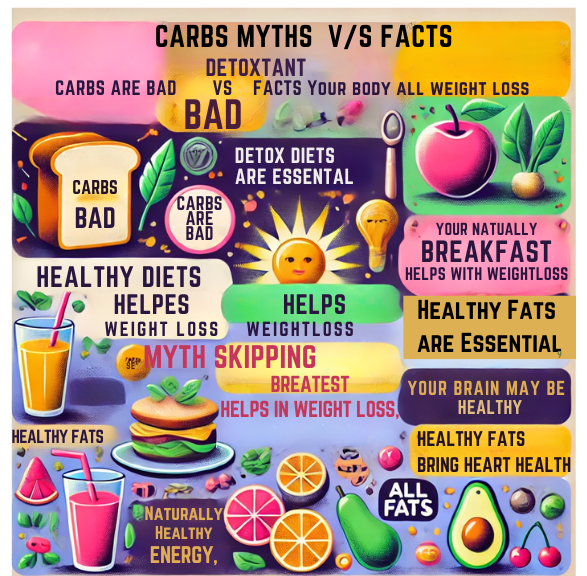
Nutritional Myth #1: Carbs Are Always the Enemy
Why This Myth Exists:
Low-carb diets like keto and Atkins have gained popularity over the years. Advocates claim that cutting carbs leads to rapid weight loss, perpetuating the belief that all carbohydrates are bad.
The Truth About Carbohydrates:
Carbohydrates are the basic sources of energy that our body needs. They act as fuel for our brains, vital organs, and muscles. Whole carbs, such as fruits, vegetables, and whole grains, are nutrient-rich and provide essential vitamins, minerals, and fiber.
The Problem with Cutting Out Carbs Entirely:
Eliminating carbs can lead to nutrient deficiencies, low energy levels, and even digestive issues due to the lack of fiber. While refined carbs like sugary snacks and white bread can contribute to health problems, not all carbs are created equal.
How to Include Healthy Carbs in Your Diet:
- Opt for whole, unprocessed sources like oats, sweet potatoes, and quinoa. It is one of the proven evidence-based nutrition tips
- .For balanced meals pair carbs with healthy fats and protein. It is one of the powerful science-backed diet tips
- Practice portion control to manage caloric intake which is a balanced diet advice.
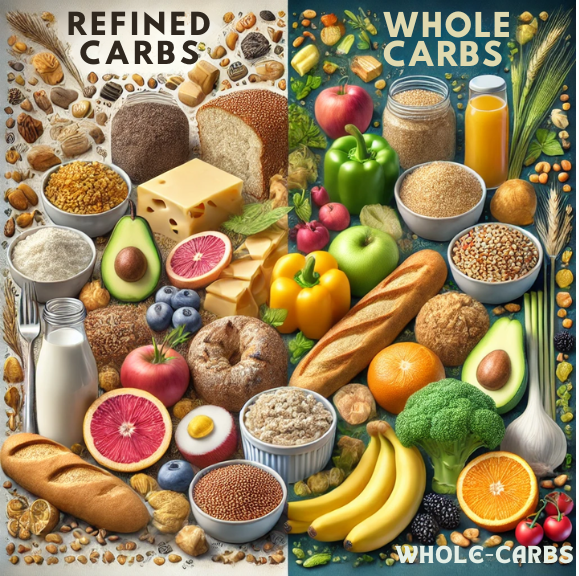
Fig. 3.02 above shows a split image of refined carbs (white bread, pastries) vs. whole carbs (quinoa, fruits, vegetables).etc.).
Nutritional Myth #2: All Fats Are Bad for You
Origins of the Myth:
During the 1980s and 1990s, low-fat diets were heavily promoted to prevent heart disease and obesity. It led to widespread fear of all types of fat and is a common nutrition misconception.
Good Fats vs. Bad Fats:
Not all fats are harmful. Healthy fats in avocados, seeds, nuts, and olive oil, are necessary for brain function nutrient absorption, and hormone production. Conversely, excessive saturated and trans fats are likely to increase the risk of heart disease.
Benefits of Healthy Fats:
- Improved heart health.
- Enhanced brain function.
- Smooth fat-soluble vitamin absorption (K, E, A, and D).
How to Incorporate Healthy Fats:
- Use olive oil or avocado oil for cooking.
- Snack on nuts or seeds instead of processed chips.
- In your weekly meals, include fatty fish like salmon.
A table comparing good fats (avocado, nuts) vs. bad fats (fried foods, trans fats).
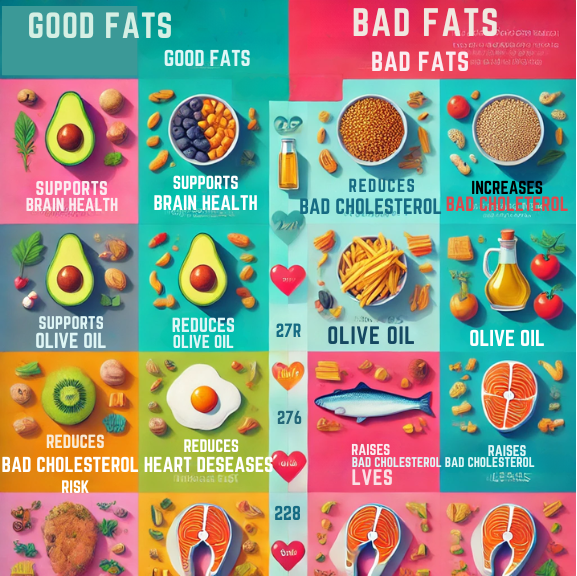
Fig. 3.03 above shows a table comparing good fats (avocado, nuts) vs. bad fats (fried foods, trans fats).
Nutritional Myth #3: Skipping Breakfast Helps with Weight Loss
Where Does This Myth Come From?:
Many people believe skipping breakfast decreases caloric intake which causes weight loss. Intermittent fasting trends have further fueled this belief.
The Science Behind Breakfast:
Breakfast kickstarts our metabolism and supply us the energy required for the day. Studies show that people who eat a healthy breakfast tend to have better overall nutrition and are less likely to overeat later in the day.
Ultimate Dangers of Skipping Breakfast:
- Increased likelihood of unhealthy snacking.
- Reduced concentration and productivity.
- Potential metabolic slow-down over time.
- What Makes a Healthy Breakfast?
- Include protein (e.g., eggs, Greek yogurt).
- Add complex carbs (e.g., whole-grain toast, oatmeal).
- Incorporate healthy fats (e.g., nut butter, avocado).

Fig. 3.04 above shows a photo of a balanced breakfast plate (eggs, whole-grain toast, avocado).
Nutritional Myth #4: Late-Night Eating Causes Weight Gain
Why People Believe This Myth:
Many associate late-night eating with weight gain because it’s often linked to unhealthy snacking. The idea that calories consumed at night are more likely to be fat has become widely accepted.
The Truth About Meal Timing and Weight:
Weight gain is due to more caloric consumption than you burn is independent of the time of day. However, late-night eating can lead to weight gain if it involves high-calorie, low-nutrient foods or disrupts your overall calorie balance.
How to Manage Late-Night Eating:
- Select healthy snacks like a handful of nuts Greek or Yogurt.
- Avoid eating out of boredom or stress rather than listen to your hunger cues.
- Plan meals to prevent excessive hunger late at night.
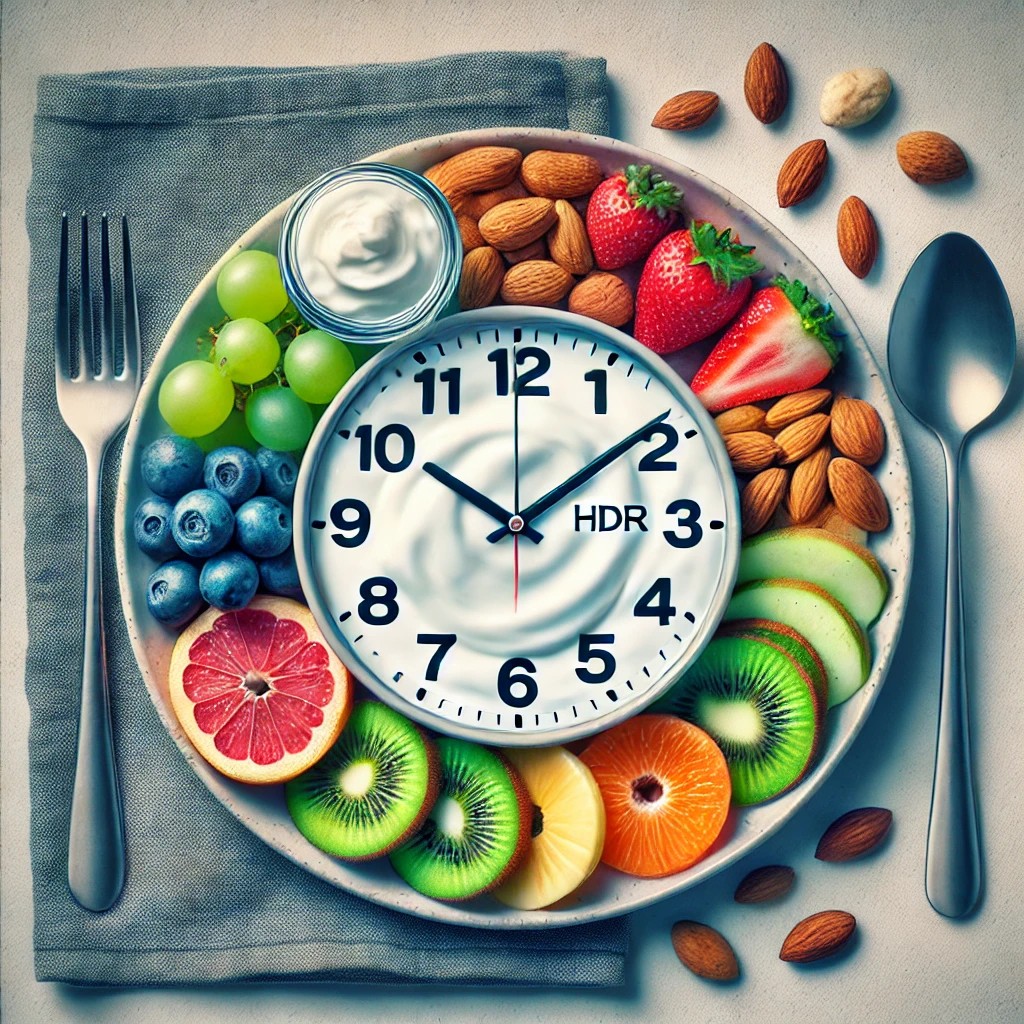
Fig. 3.05 above shows a clock overlayed on a plate of healthy late-night snacks like Greek yogurt and nuts.
Myth #5: Cleanse Your Body With Necessary Detox Diets
The Detox Diet Craze:
Detox diets often promise rapid weight loss and toxin removal through juice cleanses, fasting, or specific supplements. While these claims sound appealing, they are largely unsubstantiated.
How the Body Naturally Detoxifies:
Your liver, digestive system, and kidneys function together to remove toxins. Drinking water, eating a balanced diet, and maintaining a healthy lifestyle support these natural processes.
Risks of Detox Diets:
Nutritional deficiencies.
- Loss of muscle mass.
- Casual weight loss due to water loss not due to fat.
- Healthy Alternatives to Detoxing:
- Stay hydrated and eat fiber-rich foods.
- Avoid processed foods and limit alcohol intake.
- Get adequate sleep and exercise regularly.
- Common Factors Perpetuating Nutritional Myths
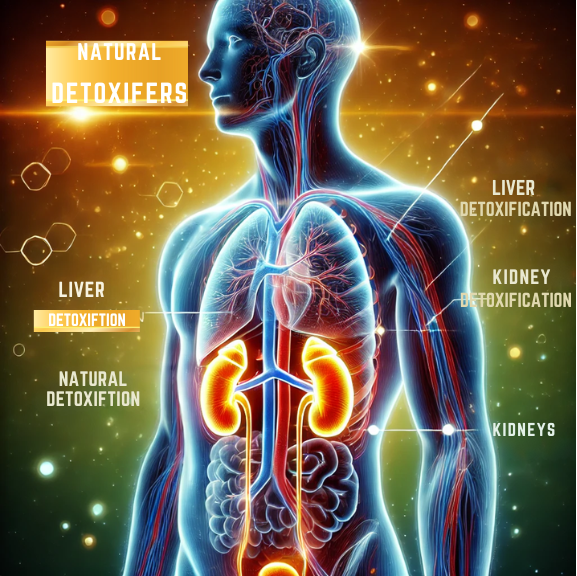
Fig. 3.06 above, illustrates the human body that highlights the liver and kidneys as natural detoxifiers.
Role of Social Media and Influencers for Nutritional Myths:
Misinformation spreads quickly online, especially when endorsed by influencers without proper credentials. Viral posts often prioritize engagement over accuracy.
Outdated Research and Misinterpretation:
Many myths stem from studies that were later debunked or misinterpreted. Nutrition science evolves, and it’s crucial to rely on updated, evidence-based research.
How to Stay Informed:
- Follow reputable sources like registered dietitians and peer-reviewed journals.
- Question sensational claims and seek multiple perspectives.

Fig. 3.07 above shows a web of social media icons, influencers, and outdated research leading to a center labeled “Misinformation.”
How Nutritional Myths Impact Health and Wellness
Real-Life Consequences:
Following nutritional myths can lead to poor health outcomes, such as nutrient deficiencies, weight gain, or chronic illnesses. For example, avoiding fats entirely can harm heart health, while cutting carbs can cause fatigue and digestive issues.
The Psychological Toll:
Believing in myths can create an unhealthy relationship with food, leading to guilt, anxiety, and disordered eating patterns.
Positive Changes Through Awareness:
- Making informed choices promotes long-term health and well-being.
- Understanding nutrition fosters a balanced, enjoyable approach to eating.
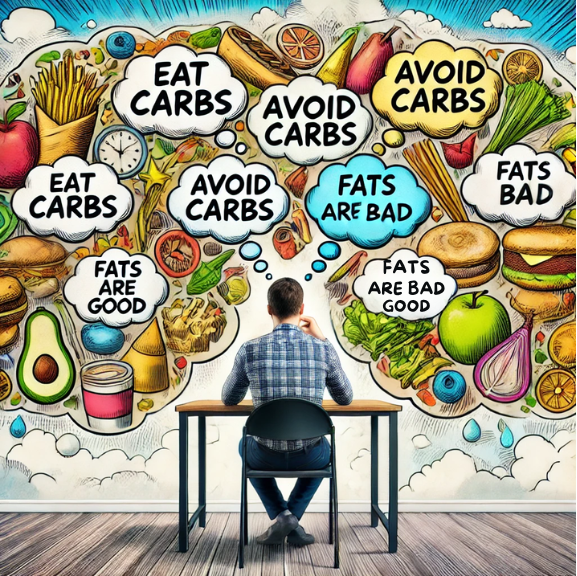
Fig. 3.08 above shows a person feeling overwhelmed by conflicting dietary advice (e.g., “Eat carbs,” “Avoid carbs”).
Tips to Identify and Avoid Nutritional Myths
Ask the Right Questions:
- Who is providing this information? Are they qualified?
- Is there scientific evidence to support the claim?
- Does it sound too good to be true?
Verify Information:
- Check multiple sources and consult experts.
- Look for studies published in credible journals.
Stay Skeptical of Trends:
- Be cautious of fad diets and miracle solutions.
- Focus on sustainable, science-backed habits.
Conclusion: Embracing Science-Based Nutrition
Nutrition doesn’t have to be complicated. By exposing the falseness of common myths and concentrating on evidence-based practices we can make a healthier, more balanced relationship with food. Beware that what is suitable for one may not be for another is true here. Personalization and science are key to optimal health.
Let’s continue spreading awareness and embracing a nutrition journey rooted in facts rather than fear. If you found this information helpful, share it with friends and family to empower them too!
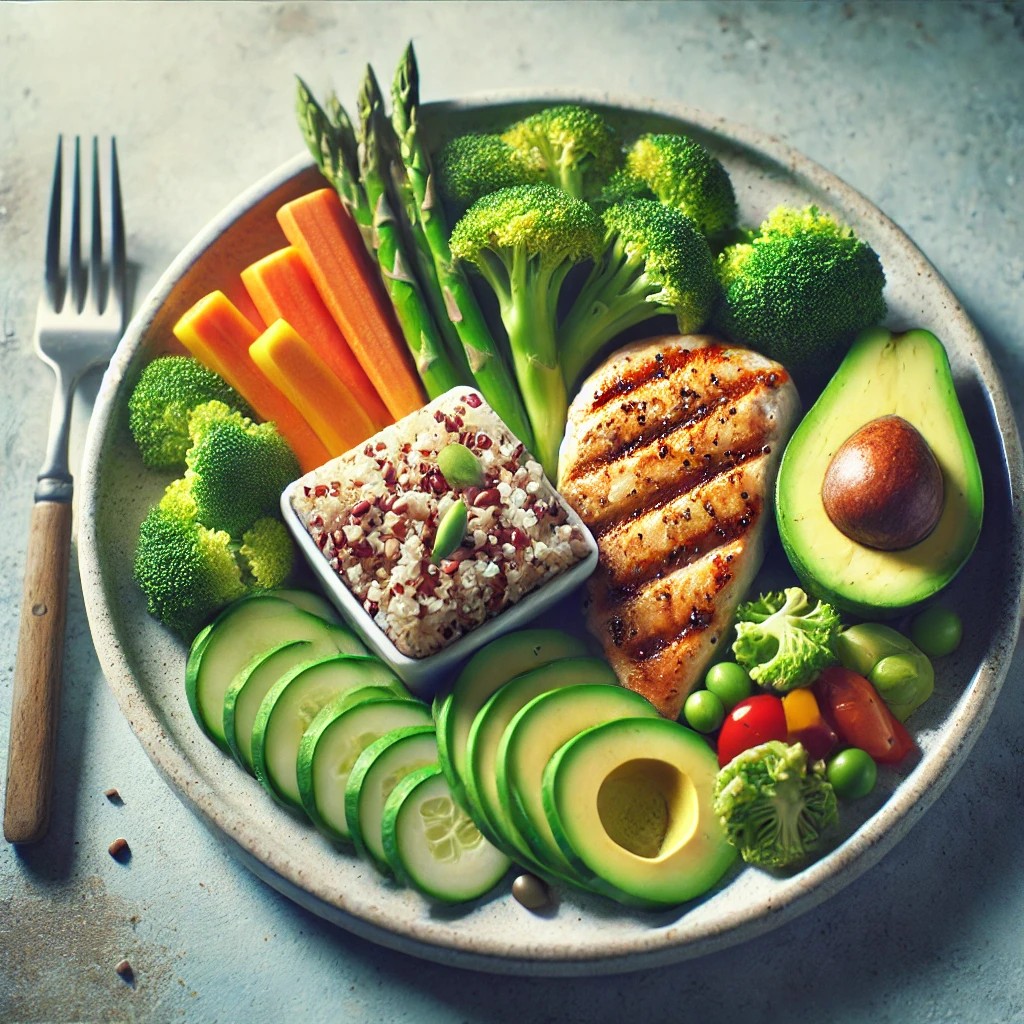
Fig. 3.09 above shows a balanced meal with several food groups on a plate, symbolizing moderation and evidence-based nutrition.
Call to Action: Share and Discuss
Have you encountered any surprising nutritional myths? Share your experiences in the comments below. Let’s start a conversation and help each other make informed, healthier choices.
Understanding and debunking nutritive myths is necessary for making informed healthful choices. By staying streamlined with confirmation-predicated exploration, questioning claims, and fostering a balanced approach to eating, you can make a healthier relationship with food. Let’s grasp a life embedded in knowledge, not misinformation.

